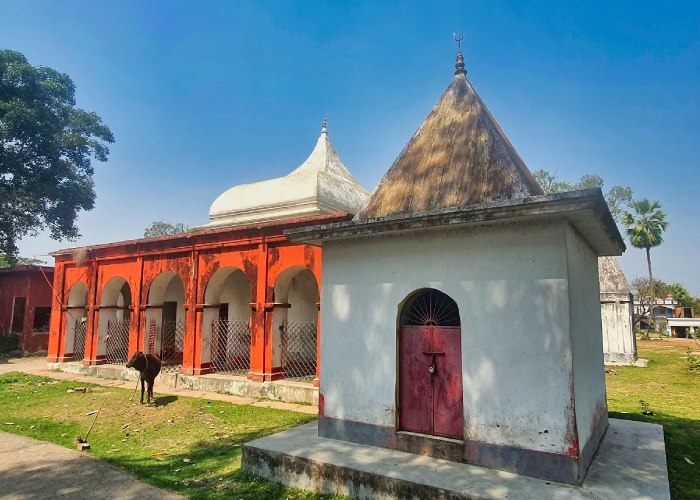On the banks of the Bhagirathi River in Kiritkona village, Murshidabad, West Bengal, Kiriteswari Temple stands as a sacred shrine dedicated to Goddess Vimala, also called Mukuteshwari, a form of Devi Sati. Built in the 19th century by Raja Darpanarayan of Lalgola, it is revered as an Upapeeta among the 51 Shakti Peethas, where Sati’s crown (kirit) is believed to have fallen. In September 2023, the village area was selected as the best tourism village of India raising its significance.
Key Highlight: The temple’s red stone, veiled as Vimala, is worshipped instead of an idol, with its crown preserved at Rani Bhabani’s Guptamath, bathed annually on Durga Ashtami.
Historical Context
The Kiriteswari Temple, over 1000 years old, marks where Sati’s crown fell, per the Devi Bhagavata Purana, earning the name Kiriteswari from “kirit” (crown). Known locally as Mahishamardini, it was a meditation site for Mahamaya. The original temple, destroyed in 1405, was rebuilt by Raja Darpanarayan in the 19th century, with renovations by Yogendranarayan Roy of Lalgola. It served as the presiding deity for Murshidabad’s ruling house, drawing hundreds daily during its peak, as local sources note. A Sanskrit slab credits Rani Bhabani for contributions, including water tanks. The temple complex, with 16 deity shrines, reflects its historical significance.
Legend
According to the Puranas and Hindu mythology, the place is known as Kiriteswari. The main deity worshipped here is Devi Kiriteshwari, also called Maa Kiriteshwari or Maa Kiriteshwari Kali. It is believed that this is the sacred spot where the crown (or “Kirit”) of Goddess Sati fell after her self-immolation and Lord Shiva’s sorrowful journey carrying her body across the world.
The temple is believed to be over a thousand years old, and in ancient times, it was regarded as the resting place of Mahamaya, a powerful form of the goddess. Locally, she is also worshipped as Mahishamardini, the slayer of the demon Mahishasura. Since her crown is believed to have fallen here, she is also known by the name Mukuteshwari – meaning “the goddess of the crown”.
The original temple was destroyed in 1405, but the present structure was rebuilt in the 19th century by Darpanarayan, the king of Lalgola. This temple is not only the oldest in Murshidabad district, but also one of the most ancient among the 51 Shakti Peethas.
There is also a well-known legend that Nawab Mir Jafar, while suffering from leprosy and lying on his deathbed, had asked for the holy Charanamrita (sacred water) of Maa Kiriteshwari, believing it might cure him.
Architectural Features
Spanning 1.5 acres by the Bhagirathi, Kiriteswari Temple adopts a char-chala style with a curved cornice and eight roof segments, built of red brick. The main shrine, 8 meters by 8 meters, houses a red stone as Vimala, veiled in red. A Bhairav temple, small and worn, sits nearby. The complex includes 16 smaller shrines, some in decay, with terracotta panels on the Ananta Basudeba Temple showing Krishna tales. A ruined temple, believed to be the original, lies across a pond.
Sculptures and Iconography
The temple lacks a traditional idol; a red stone, veiled in red, represents Vimala, bathed and re-veiled on Durga Ashtami. The crown, a sacred relic, is kept at Rani Bhabani’s Guptamath opposite the temple. A small Bhairav shrine, 3 meters by 3 meters, holds a 2-foot Shiva linga, black stone, often locked. The Ananta Basudeba Temple, 200 meters away, features a 4-foot Krishna idol and terracotta panels, 0.8 meters by 0.4 meters, depicting epic scenes, painted red.
Rituals and Offerings
Daily worship begins at 6:00 AM with priests offering fruits, flowers, and incense. At noon, anna-bhog (rice, lentils, vegetables) and sweets like payasa are offered. Special pujas occur on Durga Puja, Kali Puja, and Amavasya, with whole-night yagnas on new moons, especially Ratanti Amavasya. On Durga Ashtami, the red stone is bathed, and a new veil is placed. Devotees offer bhog and receive prasad. The Poush fair, held every Tuesday and Saturday in December–January, features rural customs since Darpanarayan’s time.
Travel Details
Accessing Kiriteswari Temple
In Kiritkona, 18 km from Murshidabad, the temple is reached by train, bus, or ferry across the Bhagirathi.
By Air: Netaji Subhas Chandra Bose Airport, Kolkata, 195 km away, connects to Delhi (2 hours), Mumbai (2.5 hours), Chennai (2.5 hours). Taxis take 4 hours, ₹3000–5000.
By Train: Dahapara Railway Station, 5 km away, links to Howrah (4 hours, ₹150–400). Autos or totos take 15 minutes, ₹50–100. Lalbagh Court Road Station, 3 km away, is another option.
By Road: Kiritkona connects to Kolkata (215 km, 5 hours), Berhampore (25 km, 45 minutes), Murshidabad (18 km, 30 minutes) via NH-12. A ferry from Murshidabad, carrying totos, costs ₹150/hour.
Hours and Entry
Open daily, 6:00 AM–10:00 PM. Free entry, while puja costs ₹100–500. No phones or cameras inside; lockers available. Wear clothing covering shoulders and knees; women in sarees or suits, men in kurtas or dhotis.
Best Time to Visit
October to March, 12–25°C, suits visits. Durga Puja (October), Kali Puja (November), and Poush fair (December–January) draw crowds; visit early morning. Avoid April–June, 25–40°C, for fewer visitors and milder weather.
Nearby Sites
Ananta Basudeba Temple, 200 meters, 1679 Krishna temple with terracotta art.
Baranagar Rani Bhavani Temple, 10 km, four char-bangla temples.
Jain Mandir, Azimganj, 12 km, 1888 temple with Jain art.
Pancha Shiva Mandir, 8 km, five interconnected Shiva temples.
Cultural Significance
Named ‘Best Tourism Village of India 2023’ by the Union Ministry of Tourism, Kiritkona blends spirituality and sustainability. The Paush Mela and Kumari Puja showcase folk dances and rural heritage. Homestays offer local cuisine like shorshe ilish and pithas, fostering cultural ties.
Final Reflections
Kiriteswari Temple in Murshidabad, West Bengal, stands as a timeless symbol of sacred heritage in India. Graced by the divine presence of Goddess Vimala and nestled along the peaceful banks of the Bhagirathi River, the temple offers a deeply spiritual experience. For devotees and travelers, it remains a must-visit destination among India’s most revered holy sites.











